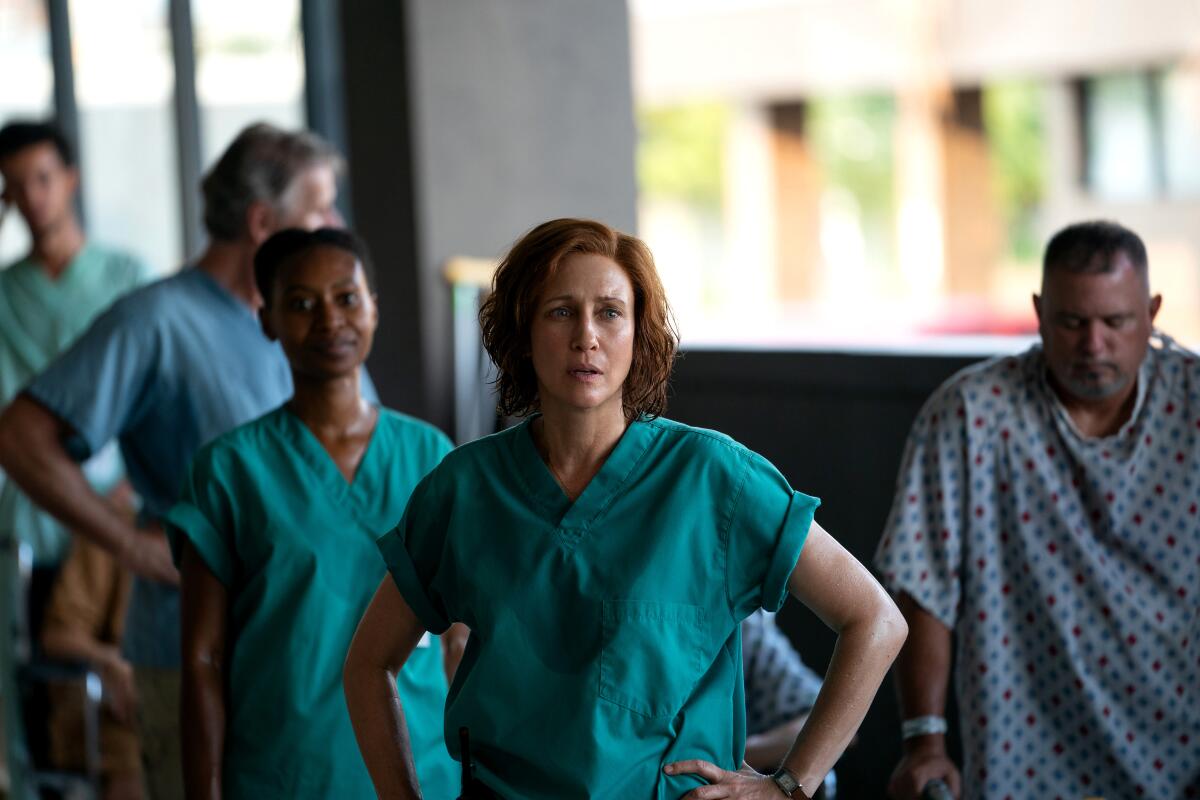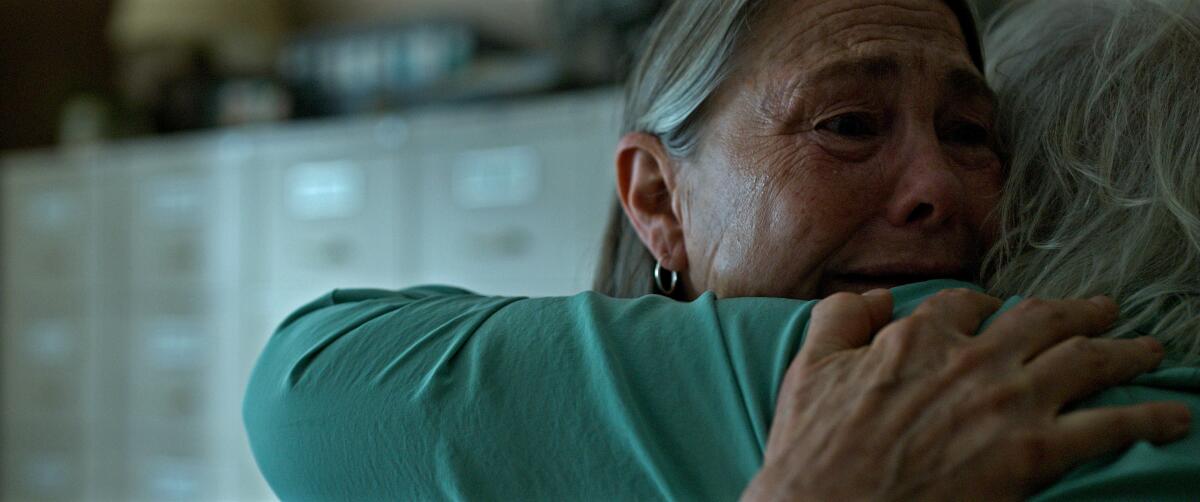‘Five Days at Memorial’ explores medical ethics at one hospital after Katrina

- Share via
New Orleans is a wonderful city in a dangerous place — half of it sits below sea level, in an area prone to flooding, protected from disaster by levees and luck, neither of which always holds. A new docudrama, “Five Days at Memorial,” which premieres Friday on Apple TV+, tells the disturbing story of a New Orleans hospital after Hurricane Katrina; arriving in the wake of a spate of real-life floods, it feels oddly topical, and as regards our inability or disinclination to prepare for the worst, even as the odds of its arrival mount, it feels endlessly topical.
Created by John Ridley (“12 Years a Slave”) and Carlton Cuse (“Lost”) from Sheri Fink’s 2013 book “Five Days at Memorial: Life and Death in a Storm-Ravaged Hospital,” the series is well-made and often hard to watch. (Ridley directed three episodes, Cuse two, and Wendey Stanzler three.) It comes across as unusually lifelike, lacking the glossy sheen that can make a docuseries seem more a Hollywood product than a believable representation of a place, time and people.
There are a few shots that are obvious special effects, but by and large the drowned city and the distressed hospital seem real rather than staged. It does a good job putting you inside the events in a way that even news footage, of which there is a good deal spliced in here, cannot. (It is an odd fact that film of an actual event can feel more abstract than its re-creation.)
Although “Five Days” tells a number of stories, in and outside the hospital, its through-line explores a question of medical ethics. Forty-five bodies were found at Memorial once the waters receded — a scene that begins the series, before jumping back to the day the hurricane hit on Aug. 29, 2005 — an unusually high number that led to an investigation into whether homicides had occurred.
Like the book, the series covers the event and its aftermath; the titular five days, which saw the staff and patients cut off, surrounded by water, without power and in increasingly stressful and unsanitary conditions, take up the first five of eight episodes. The investigation and its results occupy the remainder; each part has its own arc and its own somewhat overlapping cast of characters.
Much of the drama springs from the relationship, or lack thereof, between Memorial and a company called LifeCare, which specialized in long-term care and leased a floor in the building. They were separate entities, with their own patients and staff and corporate owners, and when the storm hit, and later when help arrived for Memorial patients, a sense of abandonment: “You’re getting your people out, and you’re leaving us to die?”
The central figure, in it from first to last, is Dr. Anna Pou (Vera Farmiga), a cancer surgeon who becomes the focus of the investigation. She is highly competent and caring, one would say to a fault, and Ridley and Cuse (and Farmiga) make her generally sympathetic and selfless; she is not that stock villain, a doctor with a God complex. She escorts a terrified nurse across a shaky, storm-battered walkway; she stays at the hospital until the end, when other doctors have left.
The script builds out her character a little; before things go bad, she puts on makeup because she’s heard a former boyfriend is working in the building; after the storm but before the flood, she shares a romantic candlelit tryst with her visiting husband (Jonathan Cake). (With a montage set to soul music, it’s the series’ one stylistically discordant moment.) They do some praying as well. In later episodes, nicely dressed and coiffed, living in her rich person’s house, working at a new hospital in Baton Rouge and defending herself on “60 Minutes,” she is somehow less likable, but this is perhaps judging a book by its cover.
Pou is not all there is to the story, though. “Five Days” brings to life various characters from Fink’s reporting, who are given enough presence so that we feel for them when feeling is required. (In these emotional scenes, “Five Days” does momentarily resemble a traditional, if less sanitized, hospital drama.) There is Emmett Everett (Damon Standifer), paraplegic and diabetic and weighing 380 pounds, praising life and talking with pregnant LifeCare incident commander Diane Robichaux (Julie Ann Emery) about her soon-to-come baby, and Angela McManus (Raven Dauda) keeping her ailing mother (Diane Johnstone) hydrated.

As nursing director and rotating “incident commander” Susan Mulderick, Cherry Jones is especially effective and low-key heroic, trying to hold things together, making it up as she goes along. “No living patient will be left behind,” she says, leaving room for interpretation. Similarly, in a smaller role as head of maintenance Eric Yancovich, Joel Keller makes an impression by remaining matter of fact.
The hospital not only had some 200 patients to deal with but also more than 1,000 locals who had arrived to take shelter there — a regular practice during hurricanes. As resources dwindle, security guards keep new arrivals away. (Objecting to this is the upright Dr. Bryant King, one of the hospital’s few Black physicians; the character, played by Cornelius Smith Jr., offers a racial perspective.) There are sequences devoted to getting patients up to a helipad, a CPR episode and a stabbing victim brought into the emergency room.
In a thread taking place outside the hospital, a couple (JD Evermore and Monica Wyche) fight their way to Memorial to get his mother out; in another, Michael Arvin (Joe Carroll), who works for the hospital’s corporate owner, attempts to get help to the hospital while his superiors complicate things.
The series builds incrementally toward its first-arc climax, in which fatal decisions are made. ICU nurse manager and bioethics committee head Karen Wynn (Adepero Oduye) will later describe it as “an organized effort to reduce the level of misery that patients had to endure, and in those last days at Memorial, all there was was misery.” Nerves fray. Doctors and nurses and administrators assume or surrender responsibilities. Rumors run wild. Confidence that help will be coming becomes suspicion that it will not. People with nowhere to go worry about being thrown out; patients worry about being left behind. Systems for deciding which patients should be evacuated first are adopted and then changed. Finally, the state police arrive and start yelling that everyone has to be out of the building in no time at all, creating a whole new level of tension.

Spread out over a longer time, the final three episodes, in which investigators Arthur “Butch” Schafer (Michael Gaston) and Virginia Rider (Molly Hager) build a case against Pou and two nurses, are less compelling; we have already seen much of what they’re just learning, and by the time they arrive on the scene, you will have likely made up your mind about Pou, or made up your mind not to make up their mind.
There is an attempt, which does feel a little bit beside the point, to enrich Schafer and Rider as characters, to give their appearances a little emotional weight beyond the desire to get their woman. (“Every time I make an arrest, I think when I knock on that door I’m changing someone’s life forever,” says Rider. “Last night I slept like a baby.”)
So they eat oysters and share details from their lives; Schafer is still recovering from a family tragedy; “things aren’t so great” between Rider and her husband, “so it’s good to have this case to focus on.” Schafer also gets to articulate the series’ underlying political point, explaining to Rider why prosecuting Pou might prove unpopular: “You know who didn’t get arrested? Nobody from any corporate entity… And what about the government officials?…. That’s what we have to overcome.” There is enough institutional and official failure to go around.
And in a more direct expression of this sentiment, a nurse, seeing Air Force One on a “flyby” of New Orleans, gives it the finger.
‘Five Days at Memorial’
Where: Apple TV+
When: Any time, starting Friday
Rating: TV-MA (may be unsuitable for children under age 17)
More to Read
The complete guide to home viewing
Get Screen Gab for everything about the TV shows and streaming movies everyone’s talking about.
You may occasionally receive promotional content from the Los Angeles Times.







